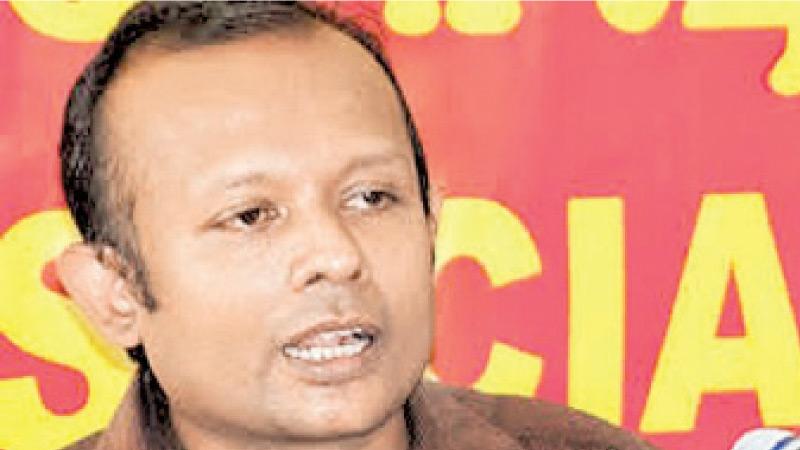
The Education Secretary of the Frontline Socialist Party (FSP), Pubudu Jagoda, said that they are willing to work with the JVP as a mass movement but will not merge with it as a political front.
He also called for a structural change in the election process as the existing system ‘makes even a good man a dishonest person’.
Excerpts from the interview:
Q. There are rumours that the FSP is working with the JVP in this elections. Is this true?
A. No, it is not. We believe that much of the change happens outside Parliament rather than inside. It is true that laws are passed in Parliament. But, if you really look at this, it is passed by the majority which is usually the ruling party. Thus, most of the laws that are passed are what the ruling party strives for. Sometimes, these laws are harmful to the public.
 However, through mass movements, which happen outside the Parliament, Acts which are harmful or discriminatory are stopped. This happened when they tried to pass the Seed Act or even tried to legalise SAITM.
However, through mass movements, which happen outside the Parliament, Acts which are harmful or discriminatory are stopped. This happened when they tried to pass the Seed Act or even tried to legalise SAITM.
We will work with the JVP during these movements, but will not work with it as an election front.We are looking at a joint mass movement after the election than contesting at the election together.
Q. How do you differ from the JVP?
A. Our principals are very different to what the JVP stands for. For example, during the last Presidential Election, the JVP spoke of the Private Public People’s Partnership (PPPP) which is not different to the United National Party’s Private Public Partnership (PPP). The JVP, in this sense, was not opposed to privatising the health system, but what we say is that the health service should not be commercialised. During the SAITM fight, however, both the JVP and the FSP got involved.
Q. What do you have to say about the movements in the universities? Who rules the students?
A. I agree that when it comes to student unions, representatives of the FSP get elected to them. But these members are voted into the union by fellow students. Therefore, the FSP cannot control what is happening within these student unions.
Q. What are your views about the street protest culture and the designated protesting area in front of the Presidential Secretariat?
A. Protesting is a tradition in our country. But there is a whole process the public doesn’t see that leads up to a protest. People write to the authorities; they go for discussions or file petitions and the protest is the last resort. When everything else fails people go on the streets to protest. For example, during the Covid-19 pandemic nurses, doctors and the minor staff attached to a hospital that comes under the purview of the Western Provincial Council were not paid overtime (OT) for their work.
They wore black bands in protest of this. Now, their OT has been paid.
We also see that people’s problems are different and therefore, who they reach out to are not the same authorities. So, having a designated protesting area is not practical because the President cannot solve all the issues.
Q. What are your election expectations?
A. This time the elections are held during a pandemic. Candidates cannot hold mass meetings or even go canvassing. Therefore, the candidates will need to have TV, Radio or News Paper advertisements. Ten television advertisements could cost up to Rs. 1.5 million. Some parties find it hard to pay this amount. We actually can’t. In addition to this, some newspapers only carry interviews of candidates who advertise with them.
We are planning to have pocket meetings and will try to educate the people about this system.
Q. What is the Fundamental Rights petition which will be filed against the police ?
A. We organised a protest on June 9 that was on par with the global ‘Black Lives Matter’ movement. We organised it by following quarantine rules such as social distancing. But even before the protest was held our members were assaulted by the police, and 53 of our members were arrested.
The police accused us of breaking quarantine laws and violating a court order.
We filed complaints at the National Police Commission and the Human Rights Commission. As a legal procedure we are hoping to file a Fundamental Rights petition against the official who gave the order to the police to assault us.
